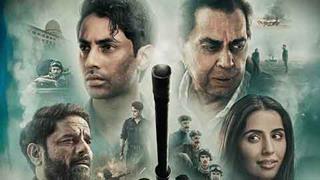Directed by Ashu Trikha
Rating: **
It's a brutal world out there. Welcome to the killing fields of Lucknow. The paths and alleys are bathed in blood. The roads are strewn with corpses. It's almost as if the city has no respite from violence.
Baabarr is arguably the most violent film ever made in Hindi. It inhabits a world where the characters live in crusty brick lanes, homes that have seen more slaying and slaughtering than the butcher shops where some of Trikha's teekha characters have their working place.
Full marks to the director, his art director (Jayant Desmukh) and cinematographer (Suhass Gujarathi) for giving the work a gritty edgy lived-in feeling. From Frame 1 Ashu Trikha goes for the corkscrew effect. The tension is unpretentiously relentless and real.
Once we enter this doomed world, there's no way out. Writer Ikram Akhtar gets substantial help from the action director Abbas Ali Moghul in giving the characters their sense of adrift despair. The characters never sit back to watch their own damned lives. They are either running from or chasing their adversaries.
 The world of the normal is given the slip, as we slip and slide into kingdom of the doomed and the damned.
The world of the normal is given the slip, as we slip and slide into kingdom of the doomed and the damned.
The protagonist Baabarr's life is chronicled in no particular scheme except the one that occurs naturally to the character's destiny. There's a ruthlessly rigorous rhythm to the narration, a sort of Ram Gopal Varma on steroids.
In fact there's a reference to Varma's Satya towards the end when the hero dismisses Satya as "just a film" when in fact his own life replicates the story of gangsterism in Satya with far more brutal candour.
In fact the greatest virtue of Baabarr is also its undoing. The world that Trika creates is too devoid of the soft supple moment and too violent and barbaric to be accepted as entertainment even by the remotest definitions of cinema.
 The performances match the mood of heightened anxiety. Om Puri as a cheesy side-changing cop and Sushant Singh as the protagonist's arch- enemy blend with the fiercely bloody fabric of storytelling.
The performances match the mood of heightened anxiety. Om Puri as a cheesy side-changing cop and Sushant Singh as the protagonist's arch- enemy blend with the fiercely bloody fabric of storytelling.Tinu Anand has one outstanding sequence where he tries to stop the protagonist from killing him through emotional blackmail.He sinks his prominent teeth into it.
Tinu should have known, there's no room for emotions in the harsh unforgiving hemisphere of hefty vendetta.
Newcomer Sohum Shah gets bravely into the sanguinary act. Not once do we feel the guy is into brand names under the boorish act. However the soundtrack is ear-splitting and often over-saturated. Does violence have to be so noisy?



















